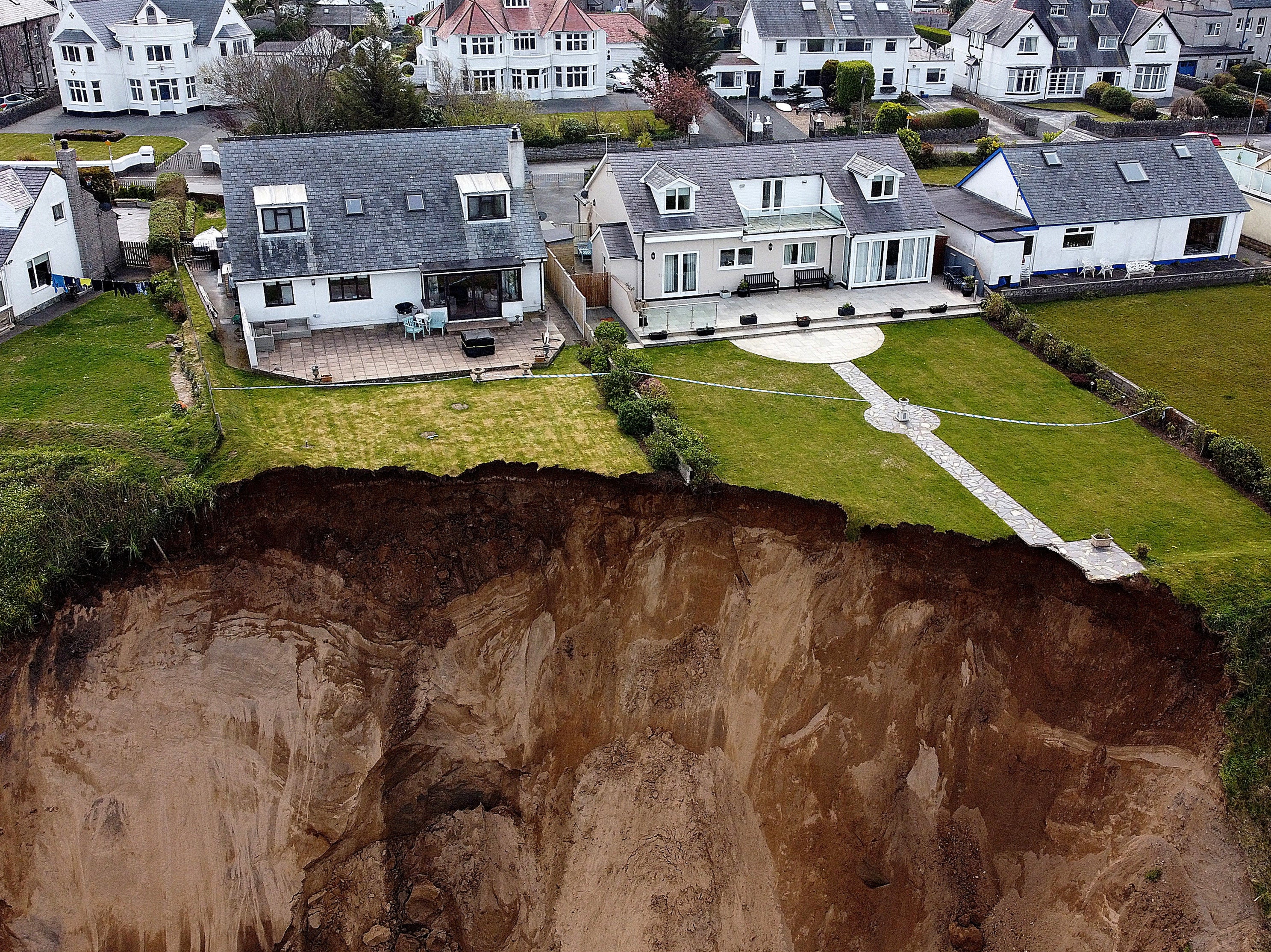Climate crisis: Why are we seeing so many huge cliff falls on the UK’s coastline?
Landslide in North Wales follows Jurassic Coast and Dover rockfalls already this spring
Your support helps us to tell the story
From reproductive rights to climate change to Big Tech, The Independent is on the ground when the story is developing. Whether it's investigating the financials of Elon Musk's pro-Trump PAC or producing our latest documentary, 'The A Word', which shines a light on the American women fighting for reproductive rights, we know how important it is to parse out the facts from the messaging.
At such a critical moment in US history, we need reporters on the ground. Your donation allows us to keep sending journalists to speak to both sides of the story.
The Independent is trusted by Americans across the entire political spectrum. And unlike many other quality news outlets, we choose not to lock Americans out of our reporting and analysis with paywalls. We believe quality journalism should be available to everyone, paid for by those who can afford it.
Your support makes all the difference.A dramatic landslide in Nefyn on the coast of North Wales has prompted Gwynedd police to warn the public to “avoid the area until further notice.”
Cliffs and even parts of people’s gardens were sent crashing to the beach on Monday afternoon with eyewitnesses saying that the damaged area is up to 40 metres wide.
According to the British Geological Survey, Nefyn is located in a “subsidence hazard zone”, meaning its surface geology is made up of weak, superficial drift deposits of clay, silt, sand and gravel.
The incident was not the only significant rockfall on the British coastline this week, following 4,000 tonnes of cliff-face breaking away from the Jurassic Coast in Dorset on 13 April.
Boulders the size of cars blocked a 300-metres stretch of beach between Seatown and Eype Beach in an incident described as the most severe seen in the region for 60 years.
“The Jurassic Coast is an amazing place to visit but it is an ever changing landscape,” Dorset Council said. “Wind, waves and weather all act on the cliffs which can fall and slip without warning.”
The same area was battered by stormy weather last summer, prompting the county council to warn visitors away from Hive Beach near Burton Bradstock over the late August bank holiday weekend.
Another significant landslide struck the White Cliffs of Dover in February this year in an alarming incident caught on film by a local fisherman.
While Britain’s coastlines can expect to be hammered throughout the year by strong winds, torrential rains and powerful waves, the frequency of these incidents might lead some to wonder whether climate change is playing a role in accelerating their frequency.
“There is clear evidence that warming seas, reduced oxygen, ocean acidification and sea-level rise are already affecting UK coasts and seas, with impacts on plankton, fish, birds and mammals,” says the Marine Climate Change Impacts Partnership, which addressed the question in its Report Card 2020 findings last year.
“The impacts of climate change have already been observed at a range of heritage sites. Coastal assets will be subjected to enhanced rates of erosion, inundation and weathering or decay,” it adds.
The collective warns the situation will get worse by 2100 if nothing is done, pointing to sea levels rising by a metre, more intense and regular storms and increased precipitation posing a greater threat if global heating is allowed to proceed unchecked.
“Coastal habitats are at risk from both the direct impacts of climate change, such as alterations in temperature and rainfall, as well as indirect impacts, which include sea-level rise and coastal erosion,” says Annette Burden of the UK Centre for Ecology and Hydrology, the project’s principal investigator.
“For example, sea level rise means deeper waters and bigger waves reaching saltmarsh, dunes, shingle and maritime cliffs, eroding the seaward edge. This causes the loss of these coastal habitats and the range of benefits they provide, such as a natural defence against the sea as well as the capture and storage of carbon.

“Many fixed coastal defences are becoming economically unsustainable, highlighting the need to recreate more natural shorelines where possible to reduce the immediate impacts of climate change.
“Land previously reclaimed from the sea could be allowed to reflood, rather than continuing to invest in costly defences there. Other management options include adding sediment to coastal habitats in order to restore them and thereby counter flooding and erosion.”
The British Isles face a unique threat from climate change, according to the London School of Economics, because: “The land is still adjusting very slowly to the retreat of the ice sheets at the end of the last Ice Age, which ended around 12,000 years ago: parts of southwest England are sinking at a rate of about 0.6 millimetres per year, while parts of Scotland are rising by 1 millimetre per year.”
“Erosion is happening faster along coastlines made from softer sediments, notably on the east coast of England, where households and businesses in areas most at risk may find it hard to buy insurance,” the university’s Grantham Institute explains.
“The Climate Change Committee (CCC) estimates that more than 100,000 properties in England may be at risk from coastal erosion by the 2080s.”
The CCC called for an “urgent” rethink of the UK’s sea defences in 2018, its chief executive Chris Stark saying the current approach to protecting the coastline in England “really isn’t fit for purpose”.
Without preventative action, the loss of Britain’s coastlines - like that suffered by Norfolk resident Lance Martin, 63, suffering sleepless nights as his beachside garden is slowly eaten up by the elements - looks likely to become more acute.




Join our commenting forum
Join thought-provoking conversations, follow other Independent readers and see their replies
Comments